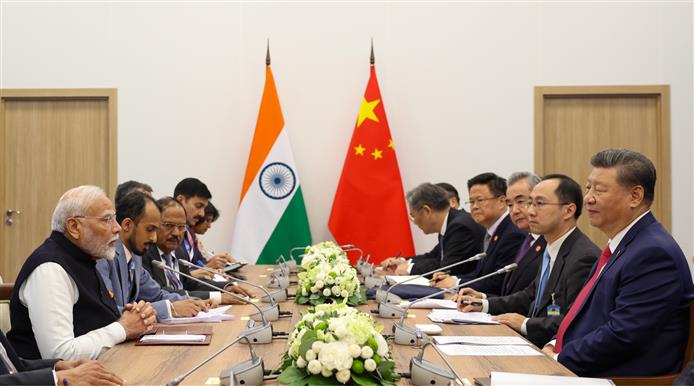The recent withdrawal of Chinese troops from the Ladakh border represents a watershed moment in Asian geopolitics, underscoring 10 Reasons India’s Rise Pushed China to Retreat from Ladakh. This significant military pullback followed intense diplomatic engagements, mounting economic pressure on China, and India’s emerging role as a formidable power on the global stage. The retreat of Chinese forces signals not just a victory for India but an affirmation of India’s future as a global superpower. This article analyses the top factors that compelled China to reconsider its military strategy, highlighting how India’s diplomatic strength, regional alliances, and economic influence are reshaping power dynamics in Asia.
Historic Agreement Pushed China to Retreat from Ladakh
The phased withdrawal of troops was formalized through a historic agreement between India and China after nearly three years of sustained tensions which pushed china to retreat from Ladakh. The border standoff had escalated in 2020, resulting in violent clashes, most notably in the Galwan Valley. This agreement signals a commitment to peace and stability by both nations and acknowledges India’s strategic strengths and its role as a growing superpower in Asia.
China’s decision to de-escalate aligns with India’s call for a return to pre-2020 positions along the Line of Actual Control (LAC). This mutual troop pullback process includes dismantling temporary military infrastructure in friction points, such as Pangong Tso, Gogra-Hot Springs, and the Galwan Valley. This significant move marks a critical step forward for India’s influence as a peace-promoting power in the region.
How India’s Diplomatic and Strategic Pressure worked for China’s Retreat from Ladakh
India’s handling of the Ladakh crisis is indicative of its rising diplomatic influence and role as a regional superpower, as highlighted by the following strategic aspects:

- Consistent Diplomatic Engagement: India’s approach has been centred on open communication channels through military and diplomatic discussions, including summits and bilateral forums. The Quad (comprising the US, Japan, Australia, and India) added indirect pressure on China to retreat from Ladakh, emphasizing India’s growing importance in maintaining Asian stability.
- Economic Measures: India’s economic measures against China have shown its strategic thinking and resolve. Since 2020, India has banned over 200 Chinese apps and scrutinized Chinese investments to protect its digital and economic landscape. This control over market access signals India’s emergence as a superpower, pushing China to avoid a prolonged conflict and further restrictions.
- Strengthened Military Capacity: India rapidly expanded its military infrastructure, including roads, airstrips, and logistical support facilities. This increased military presence and readiness signal that India is prepared to protect its interests, a stance integral to its image as a superpower in the making also contributed which made China to retreat from Ladakh
Economic Pressures on China vs. India’s Growing Superpower Status
China’s economic slowdown is a pivotal factor influencing its decision to retreat from Ladakh border, further strengthening India’s position as a regional superpower.
- Slowing GDP Growth and Challenges: China’s GDP grew by only 3% in 2022—one of its lowest rates in decades. The economic slowdown has persisted, fuelled by global economic shifts and disruptions in supply chains. The growing economic pressure on China to manage its resources reinforces India’s role as a superpower in Asia, capable of compelling its adversaries to reassess costly confrontations.
- Unemployment and Debt Levels: China faces high levels of local government debt and a record youth unemployment rate of 20%. These economic constraints limit China’s ability to maintain prolonged military activities. In contrast, India’s rising influence and economic resilience solidify its position as a superpower in Asia.
- Domestic Stability and Leadership Challenges: China’s leadership, under President Xi Jinping, is under pressure to maintain internal stability amidst economic challenges. India’s ability to leverage these weaknesses is a testament to its strategic prowess and determination to protect its sovereignty.
For an in-depth look at how India’s economic resilience contrasts with China’s current economic challenges, read more about India’s Economic Strategy to Become a Superpower.
Russia’s Role and India’s Superpower Influence in Multilateral Cooperation
Russia, as a neutral mediator, played a critical role in easing tensions, aligning with India’s superpower goals to maintain regional stability and cooperation through multilateral platforms.
- Russia’s Influence as a Mediator: Russia’s advocacy for a peaceful resolution is a testament to its investment in Asian stability. As a superpower in the making, India benefits from Russia’s role in de-escalating the Ladakh conflict, enabling India to maintain its focus on broader regional stability.
- India and China in BRICS and SCO: India’s participation in the BRICS and the Shanghai Cooperation Organization underscores its rising stature as a balancing power in Asia. These platforms allow India to exercise its influence alongside China and Russia, paving the way for sustainable diplomatic relations and reinforcing India’s superpower image.
India’s Path to Superpower Status
China’s retreat from Ladakh border underscores India’s emergence as a superpower in the making, marked by economic resilience, strategic alliances, and diplomatic skill. The factors leading to this decision—China’s economic slowdown, India’s robust diplomacy, and strategic military capacity—highlight the emergence of a new regional order where India is increasingly seen as a stabilizing force and a global player.
India’s success in safeguarding its territorial integrity while championing peace demonstrates how it is shaping a new geopolitical landscape as a future superpower. As India continues to build on its strengths in diplomacy and economic strategy, its role as a major power is set to grow, paving the way for a secure, stable, and influential position on the world stage.






